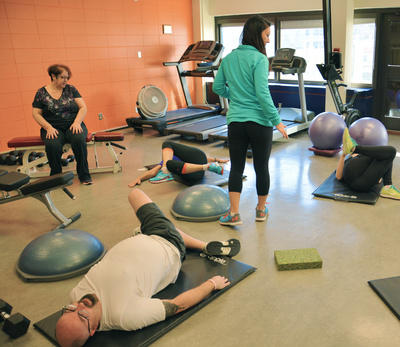
Pictured here is a RECHARGE group class during a workout session.
Kate Wilson, University of Calgary
Nov. 25, 2015

Pictured here is a RECHARGE group class during a workout session.
Kate Wilson, University of Calgary
It’s estimated that more than 8.1 million Canadians dedicate their time and resources to caring for loved ones burdened by health challenges. Often, family members put their own needs aside to attend to the needs of another, which can unfortunately result in a variety of negative health implications for the caregiver.
In recognition of the heightened health risks associated with family caregiving, researchers from the Health and Wellness Lab at the University of Calgary are examining the impact of a structured exercise program for cancer family caregivers.
“Family members are becoming increasingly responsible for providing outpatient care for cancer patients; they maintain an important, often full-time role, within the patient’s health-care team from the onset of diagnosis,” says Colleen Cuthbert, nurse practitioner in cancer care, nursing PhD candidate, and Canadian Institutes of health Research (CIHR) and Killam Doctoral Scholar.
“Family caregivers are essential to our current model of care delivery and because of the care they provide, they save the health-care system an estimated $26 billion dollars a year,” she says.
24-week study looks at how exercise can impact physical and emotional health
Along with University of Calgary co-supervisors Dr. Nicole Culos-Reed, professor in the Faculty of Kinesiology and director of the Health and Wellness Lab, and research associate at the Tom Baker Cancer Centre; and Dr. Dianne Tapp, dean of the Faculty of Nursing, Cuthbert recently developed the RECHARGE study (Renewing Caregiver Health and Wellbeing Through Exercise).
The study evaluates the role exercise plays in the physical and emotional health of individuals responsible for tending to the needs of a family member or other loved one diagnosed with cancer.
Read the full story in the Nov. 24, 2015 issue of UToday.